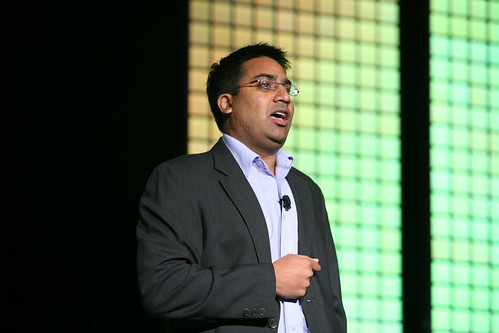 In his presentation entitled “Working in the Cloud: How Cloud Computing is Reshaping Enterprise Technology,” Rishi Chandra, Product Manager for Google Enterprise discussed why he believes cloud computing will drive innovation for the next generation of enterprise computing. The pace will be set by consumer driven innovation, the early adopters of cloud computing.
In his presentation entitled “Working in the Cloud: How Cloud Computing is Reshaping Enterprise Technology,” Rishi Chandra, Product Manager for Google Enterprise discussed why he believes cloud computing will drive innovation for the next generation of enterprise computing. The pace will be set by consumer driven innovation, the early adopters of cloud computing.
Traditionally, consumers go directly to vendors. In an enterprise environment, choice isn’t that easy. There’s a layer of business and IT that separates the vendor from the end user. It stifles creativity and innovation for the enterprise.
To create that creativity in the enterprise environment, employees become “power collaborators.” You need to connect with people to get information and to get things done. People have to work across groups. Because of this readily available access to information, through others, expectations have changed.
That collaboration, that communication, will all happen in the cloud, argues Chandra.
The cloud eliminates the need to know a variety of unnecessary elements previously needed for collaboration such as geography, computer, operating system, or even the language you speak. The cloud can be completely agnostic to all these issues, cutting through barriers for collaboration providing that idea that you have a single repository of data that anyone can access at anytime from anywhere. And since it’s based on open systems so you don’t need to know about what each user physically has at his or her desktop or mobile device.
Scale drives unit costs toward zero. He argues that if your environment doesn’t support that, you have to get to that point, and cloud computing can help you get there. And cloud computing can provide a capability your organization doesn’t have, unlimited scalability.
Barriers to cloud adoption are falling away:
- Connectivity – most companies have fast access. Customer expectations have changed.
- User Experience – People have accepted it and use it as evidenced by applications like Web-based email.
- Reliability – Google can’t be down, our customers will leave us if it does. Which is true because there are many alternatives. But if consumers are locked into a service that they’re dependent on because that’s where your network is, you’ll put up with downtime. I point to Twitter on this one. It’s been going down like crazy, yet users still hold on tightly.
- Offline Access – There are certain places you won’t have Internet access. Need to still have an offline experience within the browser. Chandra claims Google Gears answers this problem. They recently launched this with Google Docs and they will be launching it with their calendar and email application.
- Security – Have to prove that it will be strong with a Web application in the cloud. How secure are you today? It’s a misnomer. With all data on the cloud you may not have to worry about laptops or thumb drives getting stolen or misplaced.
Last thoughts from Chandra:
- On premise software is not going away.
- Even so, Google feels all innovation will happen in the cloud.
- There will be lots of competitors because the cloud is based on open standards.
- Your new employees will be the cloud generation. Under 30 crowd grew up with cloud services. They were using Web mail first.
- Google needs to earn your trust.
Make sure you check out the summary of all coverage from the Enterprise 2.0 Conference 2008 in Boston.
This post is cross-posted from the Enterprise 2.0 Blog.



